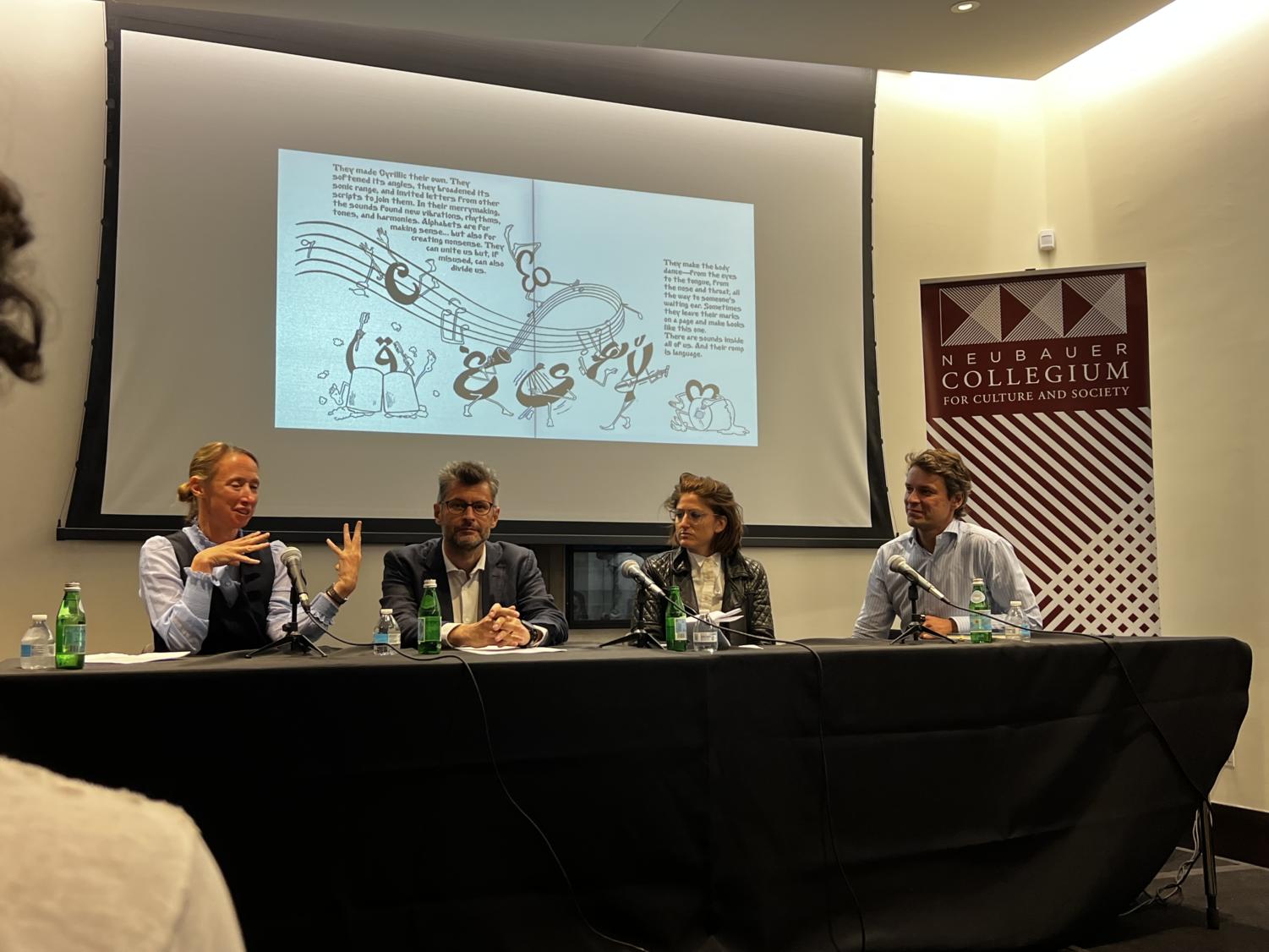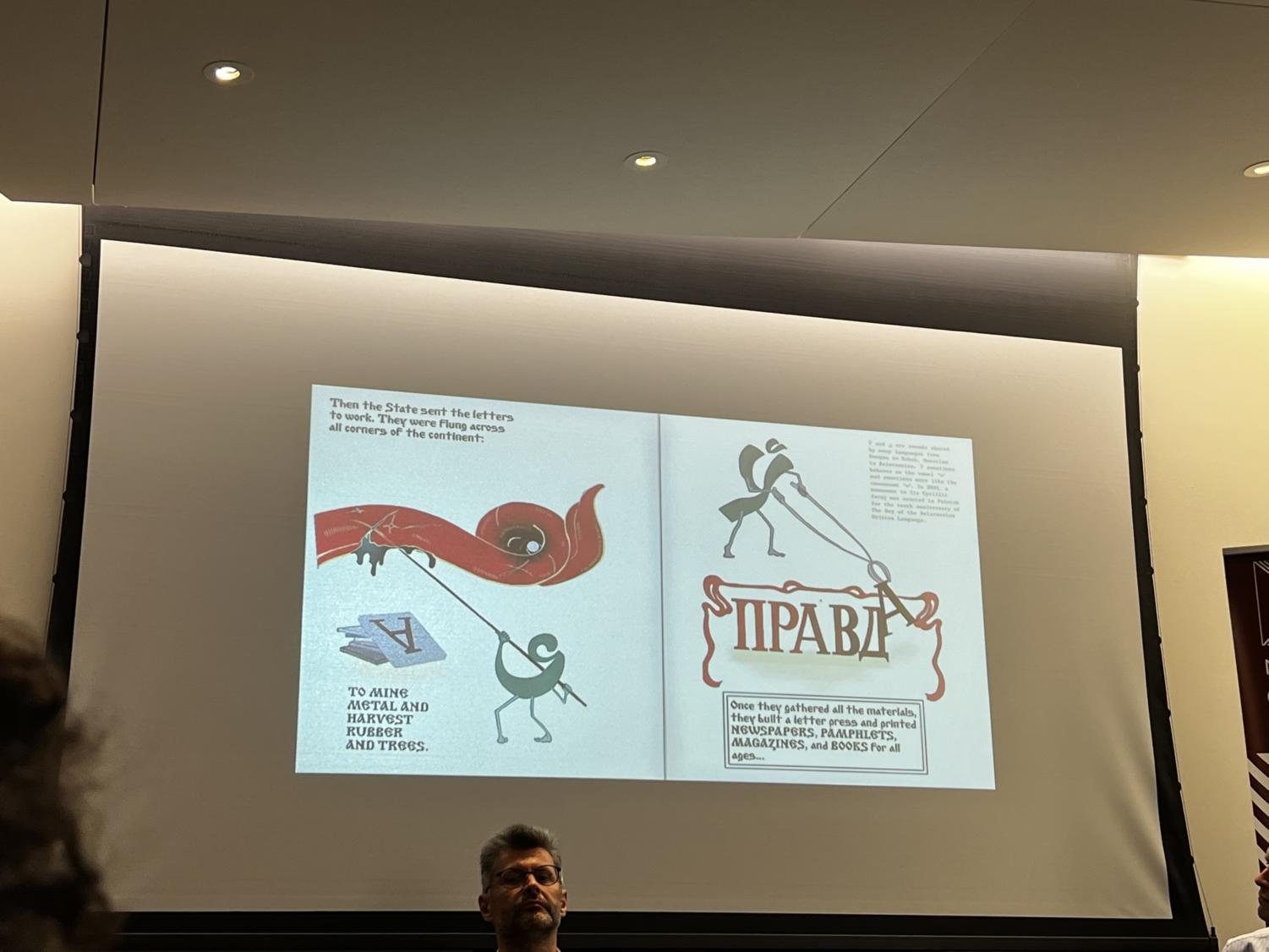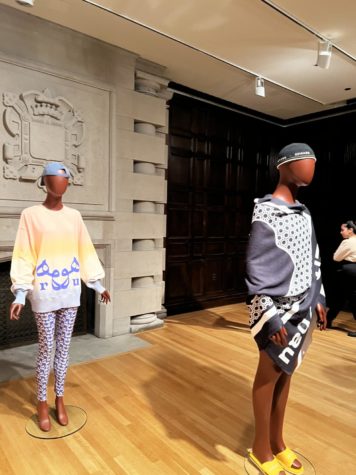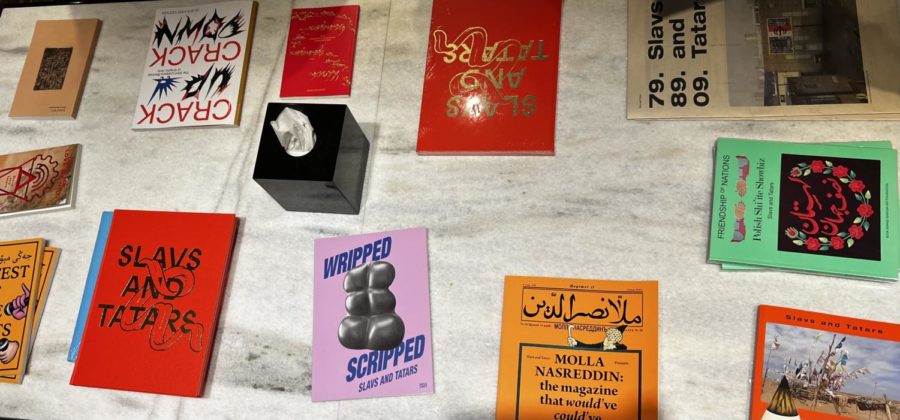Scholars of Eastern Europe Discuss Orientalism’s “History of Rupture” at Neubauer Collegium Event
The discussion concluded the Slavs and Tatars collective’s MERCZbau exhibition, on display at the Neubauer Collegium for Culture and Society from May 5 to October 7.
Books on display at the MERCZbau exhibition.
November 1, 2022
The Neubauer Collegium for Culture and Society and the Pozen Family Center for Human Rights hosted a panel of experts on October 6 to discuss the impact of Orientalism in an event titled “Reflecting on MERCZbau: Art and Human Rights in Ukraine.” Orientalism, a historically fraught term, is “the prejudiced definition, imagination, and thoughts that the Western world has established about the Eastern world by putting itself in the center,” per IGI Global. The panel discussed Orientalism in the context of “scholarship, culture, and power dynamics within the Slavic world.”
Roman Family Director at the Neubauer Collegium Tara Zahra and Neubauer Collegium curator Dieter Roelstraete organized this panel discussion to conclude the MERCZbau exhibition organized by the Slavs and Tatars artistic collective. The MERCZbau exhibition was on display at the Neubauer Collegium from May 5 through October 7, 2022.
The exhibition illustrates an “imagined present,” or the idea of how people should revise their understanding of Eastern European and Western European cultures in the wake of Russia’s invasion of Ukraine. The display considers “the long-lost history of multinational coexistence in Lviv,” the Western Ukrainian city that inspired the creation of this exhibition.
“We hope to introduce people to new and different viewpoints by exploring the intersection of arts and human rights,” Zahra said. She mentioned that the Collegium and the Pozen Family Center hope to “bring together arts, human rights, and research” through events like the panel discussion.

The exhibition intended to celebrate Eastern European cultures, said panelist Markian Prokopovych, associate professor of modern European cultural history at Durham University in the United Kingdom. Prokopovych provided a background about the historical contexts behind “monolingual orientalism” in the multiethnic cities of Lviv and Wrocław, located in the western part of modern-day Poland.
Monolingual orientalism, as explained by Prokopovych, concerns the intentional removal of linguistic characteristics such as letters to impose a politically influenced style of thought, specifically leading to negative cultural impacts in Eastern European culture. Prokopovych emphasized learning about the impacts of oriental education in “the East,” specifically in the Slavic world, and understanding the unique cultural diversity of Eastern Europe.
“The history of oriental studies is a history of rupture.… It’s important to think about the shifted meanings of the East and the West,” Prokopovych said, referring to the series of reforms following World War I and II that affected the political, economic, and social statuses of both Eastern and Western Europeans.
Panelist Leah Feldman, associate professor of comparative literature at the University of Chicago, said that script reforms, including the removal of many Slavic alphabetic characters and significant orthographic reforms, shaped “modes of communication and belonging” historically. Specifically, she describes how Russian orthographic reforms between 1917 and 1991 led to numerous alterations to the Russian language, including the elimination of several alphabetical letters in an attempt to standardize the language and build a common Soviet identity.
This reform served as the inspiration for Feldman’s forthcoming book Azbuka Strikes Back, which discusses these orthographic reforms in a manner more accessible to children.
“The story follows a group of pesky phonemes as they are summoned to leave the body, tongue, throat, and lips to enter the wider world. Once outside, the protagonists are given shapes where some fit better than others,” Feldman said.
The book aims to “decolonize, revise, and queer” children’s books from Eastern Europe and create “new forms of being and belonging,” such as by giving traditional alphabet sounds bodies to personify them. Through this personification of letters, children could better understand the impact of orientalism on history.
Feldman said that “words are embodiment” and a “conceptual art trajectory.” This link between images and words—specifically personifying words to have human-like emotions, she said—spreads important messages.
“We wanted to stress that phonemes are the sensory sound expression of linguistic embodiment. These sounds having bodies expresses the fluid forms of embodiment of their speakers,” Feldman said.

Boriša Falatar, head of the Kyiv office for the Organization for Security and Co-operation in Europe (OSCE) Special Monitoring Mission to Ukraine, discussed how Eastern Europe could be better understood in light of Russia’s invasion of Ukraine. Falatar’s presentation focused on his experience living and working in Ukraine for the two and a half years prior to the Russian invasion in February.
Falatar, who hails from the Balkan nation of Bosnia and Herzegovina, said that he had “always looked West,” knowing little about Ukraine and the history of Eastern European orientalism before working in the country. He came to Ukraine curious to learn about its human rights landscape, specifically to gain an understanding of topics like the protection of civilian victims of the Russia-Ukraine armed conflict.
His work for the OSCE Special Monitoring Mission in Ukraine involved “facilitating negotiations between the Russian federation and Ukraine through the Trilateral Contact Group.” He monitored Russia’s invasion of Ukraine and its consequences and researched Russian violations of various human rights accords.
“It is disappointing that we are satisfied with the least,” Falatar said, mentioning that “vibrant democracies are disappointingly corrupt” and “nationalists in far-right groups represent the most powerful human rights groups in a society.”
Zahra ended the discussion with a Q&A session between the panelists and the audience. Proceeds from merchandise sales from this event will be donated to support victims of the Russian invasion of Ukraine.




